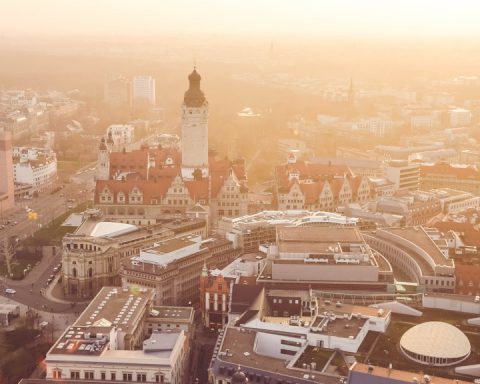Asylum-seeking in Germany is not a new phenomenon. In 1992, over 400,000 refugees from the former Yugoslavia sought asylum in this country; just two years after reunification. This time around the challenge is not necessarily the high influx of refugees seeking asylum (less than 180,000 people claimed asylum during the first half of 2015), but the large prognosticated figures (over 800,000 possible newcomers seeking asylum; although winter conditions and stricter border controls should keep actual figures lower than predicted figures).
The administrative system is under great strain because of the abnormally high influx of asylum-seekers, which has generated fears among policymakers and xenophobic sectors of society, leading to the creation of many myths. However, to better understand the possible effects of this influx, one has to first separate the facts from the predominant myths behind the politics of gaining asylum, or Asypolitik.

Myth 1: Refugee influx results in the “Islamization” of Germany.
This is the main narrative from the Pegida camp. It is true that the majority of refuges seeking asylum come from Muslim countries, and one can assume that they are predominantly Muslim. However, making a linear connection tying Muslim refugees to “Islamization” is ridiculous in light of many facts. First, there is a decades-old Turkish community in Germany that numbers in the millions. Many of them come from rural, and thus conservative, areas of Turkey. Although one can readily find a Döner in most German cities, the call to prayer is nowhere to be heard. Also, many refugees do not settle permanently in Germany (see myth four below), which makes it difficult for them to “evangelize,” even if that were their intention.
Myth 2: Refugees are here for the money and they have it easy.
There is a perception that refugees receive royal treatment during and after their asylum application process. Although they are provided basic shelter, nutrition, and access to healthcare (although many people fleeing a devastating civil war would come to think of it as royal treatment…) the bureaucratic ordeal of applying for asylum is not pleasant. First, they do not choose where they stay: Due to the policy known as the Königsstein Schlüssel, refugees are distributed by the ministry of migration and according to the administrative capacities of each federal state. They cannot leave the city where they were sent until an immigration judge rules on their case. This process can take a long while. The official wait-time is seven months, but it usually takes over one year to have a decision on an application. This is due to the fact that immigration courts have to handle applications on a case-by-case basis. Being an administrative prisoner of sorts, and living on (very) basic state-provided services is not the definition of royal treatment. This was the reason why many people fled East Germany to West Germany during the times of the Cold War…
Myth 3: (Asylum-seekers) take our jobs!
Probably the most-heard anti-immigration or anti-refugee slogan worldwide is absolutely not true for asylum-seekers. The reason is that they legally cannot take employment. The status of Asylsuchender or asylum-seeker, which refugees have once they register in Germany as refugees upon their arrival, until an immigration judge decides on their case, is not an Aufenthaltserlaubnis or residence permit, which is required of every non-EU citizen to stay, travel freely, and work in Germany. The status of asylum-seeker not only has travel restrictions but work-prohibition. They are granted a work permit once their asylum application is granted and even then they face the greatest obstacle that any foreigner in Germany faces: Deutsch lernen! It is difficult to gain employment in any country if you do not speak the official language well. Refugees cannot take state-financed language courses until they have a residence permit. During their time as asylum-seekers they can only take language courses if they paid for them out-of-pocket or if German-speakers volunteer to instruct them. (Editor’s note: It might be possible, however, for asylum-seekers to take internships.)
Myth 4: They are here to stay.
Actually, over half of them do not. On average, 50% to 60% of refugees arriving in Germany return to their home country or to the EU country where they first settled. Some return because the situation in their home country improved, as was the case with many refugees from the former Yugoslav republics. Many are sent back because their asylum application was denied. At many points during the long process to get awarded a residence permit as a refugee, that application can be rejected. It can happen at initial arrival if the travel documents and claim for asylum do not satisfy the initial police/immigration officer as generally plausible. The application is (usually) rejected if the asylum-seeker was already in another EU-country or “safe” third-country (according to international law, one has to apply for asylum in the first “safe” country where one arrives). Thereafter, the asylum-seeker has to show that a state violated his or her human rights, and thus requires refuge. Refugees from Syria and Eritrea are usually granted asylum because Germany recognizes that Syria and Eritrea systematically violate the human rights of their citizens. However, citizens from most other countries (including Iraq for example) have to show evidence that they suffered a human rights violation, or will be subject to one if sent back. This is a tall order in many cases, which results in many applications being denied and the asylum-seeker being sent back.
The complex nature of the politics of gaining asylum in Germany makes sure that the relatively high influx of refugees will not impact Germany severely. This is also true of the social dynamics of migrant integration, as seen with the Turkish case. The forecasts of refugee influx may not be as a high (winter is coming!), no one will have be forced to give up drinking great German beer or eating Currywurst, no one needs to envy being a refugee, and if you really do not like them, then be assured that most will not stay…
The very complicated facts of Asylpolitik easily debunk the xenophobic myths that have been circulating around.
Note: I would like to thank the Refugee Council of Saxony (Sächsicher Fluchtlingsrat e.V.) for the informative event they held recently on the German asylum process.










